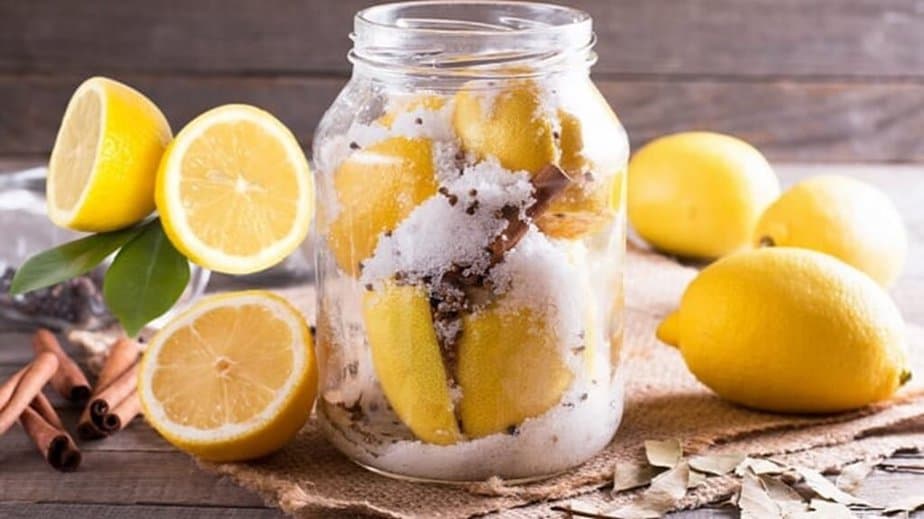‘Preserved lemons’ sound to be an exotic ingredient but they are very easy to make. It isn’t something that you can make and eat immediately like other dishes but a few weeks of seasoning is required. If you can’t wait for so long, use a preserved lemon substitute.
In this article you’re going to read about the best alternatives to preserved lemon, also a little about its taste profile and uses in cooking.
What is preserved lemon?
Preserved lemon or lemon pickle is a condiment that is common in several cuisines, especially in Middle Eastern, Moroccan, and Indian cooking. In English cuisines, it is known as ‘leems’ and ‘country lemon’.
Basically, preserved lemons are whole or sliced lemons that have been pickled in salt. After a month of preservation, the salt mellows the lemon rind and renders a salty, tangy flavor. The process of preservation involves natural fermentation that helps to reduce the bitterness of lemons.
Usually, the Indian lemon pickle is made by cooking the lemon/lime with pickling spices and then leaving it to ferment in an airtight jar for a few weeks before use. Lemon pickle is spicy and has strong lemony flavors, unlike preserved lemon which exclusively contains only salt and lemon.
What does preserved lemon taste like?
The flavor and aroma of preserved lemon are vastly different from lemon zest, juice, or whole lemon. It loses its sharp flavor but the lemon flavor intensifies. Lemon fermented in salt develops punchy umami characteristics giving an incredible depth to dishes. They add an intense, concentrated lemon flavor to the recipe without the sour tartness of fresh lemon.
Note that the complex flavor of preserved lemons isn’t everyone’s cup of tea, not recommended for those who are averse to salt.
How to use preserved lemon in cooking?
The skin and pulp of the preserved lemons are edible. Lemon pickle is commonly used as an appetizer and side dish in Indian rice meals. The pulp works best in stews and sauces, but the peel is the preferred choice in several recipes.
Preserved lemons work well in:
- Stews
- Dressings
- Paring with cheese
- Middle Eastern dishes
- Salsas
- Indian fish curry
- Rice dishes
- Savory dishes.
How long do preserved lemons last?
A well-seasoned (2 to 3 months) preserved lemon can be safely stored in your fridge for up to 1 year. The pickling juice of the preserved lemon can be used two or three times over the course of the year.
Note, if the lemons stay fully covered in salted lemon juice then there is no chance of trouble with botulism. The salt ratio is sufficiently high in preserved lemon thus any bacteria would become ineffective. Remember, once the airtight jar is opened for use, always store the jar in the refrigerator and never store it at room temperature.
What is a good preserved lemon substitute?
It is easy to make preserved lemon at home but needs a few weeks of fermentation before use. For immediate use, you may use a substitute for preserved lemon. Here are the best replacements to consider in a pinch:
1. Lemon Zest
Lemon zest has a lemony flavor like preserved lemon though not strong. Of course, it can’t mimic the complex umami-like flavor of preserved lemon.
Lemon zest is easily available or can be quickly prepared by you at home. Also, it goes with almost all recipes that call for preserved lemon though different in texture. The mild flavor of zest cannot fully compensate for the deep flavor of preserved lemon, still a manageable alternative worth considering.
2. Lemon Zest and Sea Salt Flakes
The essential flavor feature of preserved lemon is a blend of lemon and salty flavor. Thus, when you don’t have preserved lemon, use a blend of salt flakes and lemon zest instead. This blend is not a perfect substitute still a workable option.
Note, reduce the use of salt in your recipes while using a combination of lemon zest and salt flakes as a substitution for preserved lemon.
3. Slat-Preserved Lemon Peel
Salt-preserved lemon peel is a Middle Eastern/Moroccan kind of dish. Usually, boiled and dehydrated lemon peels are blended with salt flakes and oil, stored in an air-tight container and it stays fresh for long. It tastes like the preserved lemon though milder. These peels can very well be used in most recipes that call for preserved lemon.
4. Salt Flakes and Lemon Juice
In a pinch, simply use a tablespoon of lemon juice with a teaspoon of salt flakes diluted in this juice in place of persevered lemon. It adds a mixture of salty lemon flavor to your dish, somewhat similar to preserved lemon though not perfect. While using this substitute, make sure to balance the salt needed in your recipe.
The Final Thought
Preserved lemons are pickled in salt and their own juices, and left to sit for a minimum of a month before use. A little of this pickled lemon can elevate the flavor profile of your dish with a delicious taste. Lemon zest or lemon juice with slat fakes is a good substitute for preserved lemon.
Related articles:
- What is a good substitute for lime juice?
- Looking for a tamarind paste substitute?
- What can I use instead of Kaffir lime leaf?
